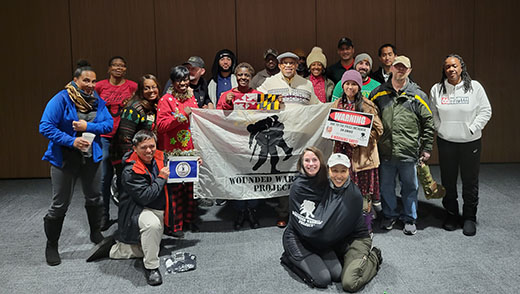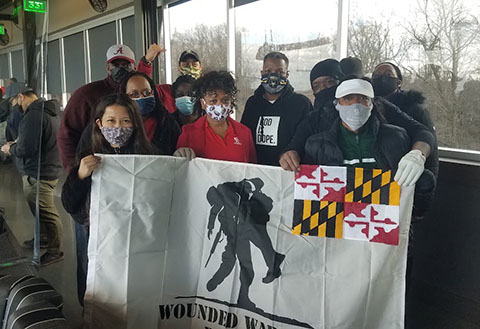The Power of Peer-to-Peer Veteran Support

Wounded Warrior Project Helps Veterans Build Connections Through Peer Mentoring, Bonding
Mentoring can consist of many different things. Sometimes, it can be helping someone with schoolwork, navigating a career, or providing motivation. In many cases, it’s as simple as offering a listening ear and a shoulder to cry on. These constructive relationships may be even more crucial for veterans because of the unique mental and physical health concerns that often come from military service.
Veteran peer support groups through Wounded Warrior Project® (WWP) allow post-9/11 veterans a safe place to connect and learn from others who understand what they’re going through.
Connection is a vital component of finding fulfillment. According to WWP’s 2021 Annual Warrior Survey, 62% of the warriors surveyed reported feeling lonely, and warriors who have been out of the service longer have higher overall loneliness scores. The survey also showed the likelihood of experiencing post-traumatic stress disorder (PTSD) symptoms is 57% lower among warriors who have maintained the social support of their military friends.
"I feel privileged to be doing this,” said Army veteran Claude Boushey, who serves as a peer support group leader in Waldorf, Maryland. “The support group gives warriors a safe environment; a place to network, establish friendships, be able to vent certain things, and to learn about resources.”
Finding Those Who Understand
Rochelle Cooper was a junior in college and had been in the Army Reserves for a few years when she received her deployment letter to Iraq. She was given a 10-day notice. After almost two years serving overseas, she returned to the U.S. and delved into schoolwork, trying to put the things she experienced in the Middle East behind her. Eventually, she could no longer ignore what was happening with her mental health. She sought help through VA and realized there were resources available to help her.
After moving to Waldorf, Maryland, in 2014, Rochelle discovered the WWP veteran Peer Support Group led by Claude and decided to attend a meeting.

“That has been life-changing,” Rochelle said about finding the group. “At that point of my recovery, I wasn't seeing a counselor regularly. So going to the peer support meetings was beneficial because you get to go and release whatever is troubling you. It’s a safe space. Even times when I did not feel like sharing, it was helpful to be there, and know that you weren't the only one going through things.”
Peer support for veterans not only gives warriors the opportunity to share their experiences, but to learn from others. Claude recalls one warrior who would attend every monthly meeting but didn’t open up about her experiences. She would just listen to others in the group and was never pushed to talk. After years of attending the meetings, she finally shared her story. She thanked Claude and the group for giving her the space to feel comfortable and not feel pressured. When it was time to share her own story, she knew she was in a safe place.
“For many warriors, the peer support group might be their first Wounded Warrior Project event,” Claude said. “They may still be kind of closed off and recovering. So, the support group gives them a safer environment to open up initially. That first step is very important.”
Building Friendships and Family
While the peer support groups serve as a way to connect and mentor veterans, many members find lasting relationships that carry over well beyond the monthly meetings.
“The individuals in the group have become my friends,” Rochelle said. “We support each other in all avenues of life. The camaraderie is just awesome. We connect outside of the peer group and do things together because we’ve actually developed a family.”
When Rochelle graduated with her Ph.D., peer group support leader Claude Boushey and two other peer group leaders attended the event, which was several hours away.
“That’s the kind of support that is there,” Rochelle said.
Claude said group leaders keep track of dates that might carry significance, whether it’s birthdays, Alive Days, or anniversaries of the loss of a friend or loved one, so that they can reach out and make sure warriors know someone is there for them and cares about what they’re going through.
“The main thing that we’re trying to get across is that you’re not alone,” Claude said.
Sharing in Successes
According to the Annual Warrior Survey, 90% of warrior respondents agreed that people who aren’t in the military don’t understand their experiences. Peer support enables warriors to develop the social support and mentorship of fellow veterans that they may have been missing.
"Regradless of where they are in their recovery, whether from visible or invisible wounds, camaraderie is something they miss, and they get to recapture it in the support groups,” Claude said.
Throughout his time as a peer support leader, Claude has seen many positive changes in warriors who attend. He’s seen them go from a very dark and lonely place to getting married, finding new jobs, or like in Rochelle’s case, get a doctorate degree. Hearing from others who served and dealt with similar struggles, but have come out the other side, can be a huge source of encouragement and inspiration.
“To meet up with like-minded people; to have someone that you can confide in if you don’t want to talk to a professional, just for familiarity’s sake, who knows what you’re going through, has been very beneficial in my recovery,” Rochelle said. “I wouldn’t change it for the world. And Wounded Warrior Project has made that possible.”
Claude said it’s important to recognize the hard work peer support group members put in to improve their own lives, and the lives of their fellow warriors.
“It’s those stories [of success] that you don’t always hear about, but it validates what the support group is doing,” Claude said. “You may hear about all the statistics of veteran suicide and self-medicating, but you don’t always hear about the lives we’re saving every day. It’s happening all the time through groups like these and through Wounded Warrior Project.”
Looking for peer support in your local area? Refer to our list of veteran peer support group locations or reach out to our resource center for additional assistance.
Contact: — Paris Moulden, Public Relations, pmoulden@woundedwarriorproject.org, 904.570.7910
About Wounded Warrior Project
Since 2003, Wounded Warrior Project® (WWP) has been meeting the growing needs of warriors, their families, and caregivers — helping them achieve their highest ambition. Learn more.